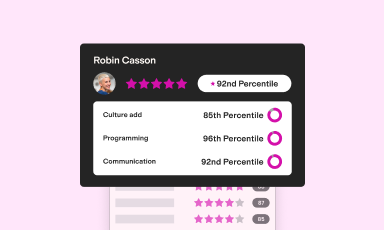With 75% of employers struggling to find candidates with the right combination of soft and technical skills, it’s more important than ever to widen your talent pool.[1]
Homeschooled children often develop key in-demand skills like self-discipline, creativity, and adaptability. This makes them valuable employees in a rapidly changing workplace.
However, they’re 23% less likely to attend college, so many homeschooled individuals are excluded from opportunities requiring a degree.[2]
This means you need to think differently about hiring in order to reap the benefits that homeschooled employees can bring to your company.
In this post, we’ll explore the pros, cons, and impact of homeschooling. Additionally, we’ll share how to revamp your hiring process to attract more homeschooled talent and build a diverse workforce.
The homeschooling phenomenon
Homeschooling is on the rise around the world, and it’s not just driven by the pandemic.
Let’s take a look at why.
Who’s being homeschooled and where?
Once considered “alternative,” homeschooling is rapidly gaining ground in several countries. In the US, some 3.1 million children in grades K-12 were homeschooled in 2021-2022.
Unsurprisingly, the global homeschooled population grew significantly during the pandemic years, though COVID-19 is only one reason why. In fact, 81.46% of respondents in one study who started homeschooling during the pandemic had already made the decision beforehand.[3]
Homeschooling spans many cultures, ethnicities, and belief systems. In 2019, 41% of US homeschoolers were Black, Asian, Hispanic, and other non-White/non-Hispanic ethnicities. Since motivations include the desire to shield children from racism or lower expectations in public schools, it’s not hard to see why.
Arguments for and against homeschooling
Depending on which studies you read, homeschooled children perform better or worse academically than their peers and are either more or less socialized and successful in later life.
This means it’s hard to judge homeschooling based on hard data. However, a 2022 study found that formerly homeschooled adults are generally more open to new experiences, agreeable, conscientious, and civically engaged than their school-educated peers. They’re also less neurotic, generally well-socialized, and able to fit in with others.[4]
Other arguments for and against homeschooling include:
Pros:
The chance to deliver better, personalized education that suits kids’ interests and learning needs or style.
More flexibility for kids to follow their interests, develop their passions, and learn at their own pace.
Freedom to explore other teaching approaches, values, and worldviews.
One-to-one attention.
Easier to cater for special needs children.
Protection from the bullying, violence, and abuse (physical, mental, drugs, alcohol) that can occur in schools.
“I felt like I very much could explore the things I was interested in, within reason. I was interested in psychology and so that ended up being one of my courses. Then I did anatomy and physiology because at one point I wanted to be a physical therapist. I think that flexibility is really valuable…. “I'm grateful for that ability to shape a bit what my high school experience looked like, and to explore some things that I was interested in pursuing for a career.”
Anna Beckmeyer, homeschooled learner and ENL teacher at Ascend Charter Schools.
Cons:
Education and materials are expensive and there is rarely any state support. Plus, if one parent is homeschooling, they’re not earning.
Kids miss out on opportunities to socialize, like break time, after-school activities, and clubs, so parents need to make an extra effort.
Limited opportunities to develop public speaking skills, self-advocacy, or competitiveness.
Less chance to learn to collaborate or work to deadlines.
Now, let’s take a look at how homeschoolers can turn out.
What can homeschooled individuals bring to your organization?
Here are six qualities that homeschooled individuals can bring as employees at your organization:
1. Self-directed lifelong learners
Homeschooled kids are more in control of their learning journey. This means they’re likely to become good lifelong learners, which is vital for today’s rapidly changing workplaces and roles.
Homeschooling, says Anna, taught her “how to teach myself. [It] wasn't necessarily a teacher guiding me through the entire content, like in a school setting, but more having materials, books, and resources, and using them to learn the subject matter, and then having someone there if I needed help.”
As well as preparing her for autonomous learning in college, she entered the workplace with “a competence, a confidence… that I'll always be able to learn a new skill or task that's required for my job. So even if something seems daunting, there's this past experience that I have going into it, that ‘I've been teaching myself new things since I was 10 years old. This is just that, and I know how to do it.’”
2. Confident and self-motivated
Learning at their own pace means homeschoolers aren’t bored, rushed, or struggling to keep up. They’re also not competing for attention, which can be hard for shy children in a classroom setting.
Motivated children are also likely to take pride in their accomplishments and be driven to continue learning and growing.
3. Proactive and accountable
Being responsible for your learning fosters accountability and ownership, which are crucial for teamwork later in life. Homeschooling also requires discipline and time management – though these skills are by no means exclusive to homeschoolers.
Being proactive and taking the initiative also means homeschooled adults may be more likely to seek the resources or help they need rather than waiting for someone to provide them.
4. Flexible and adaptable
A non-standard environment allows you to learn in a variety of settings – no need to wait for the annual field trip to get out there and study biology in the wild. Experiential learning can also boost knowledge retention and skills development.
The ability to adapt to different situations and challenges is extremely valuable in modern workplaces where you may need to work in a variety of settings and with different people.
5. Creative, critical thinkers
Homeschooled children are encouraged to find answers or work through things alone. This fosters creative problem-solving, critical thinking, and innovation.
6. Interested and curious
The sense of curiosity instilled in Anna by homeschooling “as an adult, turned into being curious not just about how the physical world works… but about how people think, worldviews, cultures, and belief systems.” This, she believes, “means you're willing to learn and that you'll work well with a variety of people because you're going in curious and not judgmental or with preconceived notions.”
Additionally, when kids can pursue their passions, they’ll grow up with a better understanding of what they do and don’t enjoy. Employees who love what they do are more likely to stick around, which maximizes ROI on hiring.
“We've always encouraged [our homeschooled kids] to enjoy their childhood, enjoy learning what excites them, and in a way that suits them. We'd rather they gain skills and experience in what they'll eventually want to do with their adult lives, not conform to the norm of going to college, struggling to get jobs that, actually, they may not really want. It's wonderful to see that the future looks likely to be even more suited to them, as they go forth and gain lived self-learned skills and experience, rather than the piece of paper that claims they're qualified to do something.”
Rebecca W, customer advisor, City & County of Swansea.
Now that you know the benefits, let’s look at how to get homeschooled employees through the door.
The best insights on HR and recruitment, delivered to your inbox.
Biweekly updates. No spam. Unsubscribe any time.
7 ways to tap into homeschooled talent pools
There are lots of ways to attract homeschooled talent – and boost your diversity, equality, and inclusion (DE&I) efforts. It just takes a mindset change and a bit of creativity.
1. Ditch degree requirements
Insisting on four-year degrees excludes homeschoolers who didn’t attend college. It also hinders your diversity, equality, and inclusion (DE&I) efforts.
It isn’t even an accurate predictor of on-the-job success, engagement, or long-term tenure.
College degrees are now the new high school diploma, which has led to “degree inflation” with employers insisting on degrees for jobs that didn't previously need one.
In the US, just 37.9% of people over 25 hold a bachelor's degree or higher. This means that making them mandatory restricts your access to talent by around 60%.
As well as homeschoolers, this excludes people from marginalized groups or underserved communities who didn’t pursue formal higher education. Given the high percentage of diverse homeschoolers, those are barriers you can’t afford to be putting up. You could even be unintentionally engaging in biased, discriminatory hiring practices by screening them out.
2. Use skills-based hiring
It’s not just degrees that don’t accurately predict candidate success. Outdated resumes play into unconscious biases that can lead to bad hires.
To get around this, switch to skills-based hiring to make data-driven decisions based on fair, accurate talent assessments. These also let non-college-educated candidates demonstrate valuable soft skills gained during homeschooling. Skills-based hiring levels the playing field for diverse candidates and can increase workforce diversity by 91.1%. In our 2022 State of Skills-Based Hiring report, 91.2% of companies also saw an increase in employee retention after switching to skills-based hiring.
3. Write more inclusive job descriptions
As well as removing degree requirements, avoid gendered or ableist language and cultural and racial biases in job descriptions, as these can turn off diverse candidates.
Avoid terms like “native speaker,” mentions of race or national origin, and industry jargon or corporate language, which may exclude younger candidates or those new to your field.
Instead, emphasize culture add and transferable skills over culture fit to attract those from “alternative” backgrounds.
Remember that candidates without a degree may be applying for entry-level roles, so career and pay transparency help them see a future with your organization.
4. Network and connect with homeschoolers
To recruit homeschoolers, advertise where they hang out, like homeschooling websites, forums, and social media groups.
Partnering with organizations like the Home School Legal Defense Association, National Home Education Research Institute, or Homeschool World will also help you build relationships with the community.
Attend homeschooling conferences, fairs, and workshops such as the US multi-state Great Homeschool Conventions or country- and state-specific associations. You can even search for “home education” on sites like Eventbrite.
5. Offer internships and apprenticeships
Internships and apprenticeships offer homeschooled students a chance to gain vital work experience. Getting a foot in the door is particularly valuable for those who can’t fall back on networks built up at school or college.
Internships and shadowing opportunities also let homeschooled students demonstrate skills and learn new ones.
6. Tackle bias and misconceptions
To hire homeschooled candidates, tackle objections and misconceptions from existing employees and stakeholders, including:
Homeschooled people lack soft and social skills. There’s an assumption that homeschooled kids are isolated, only associating with their families. However, the stats don’t back this up. Pre-employment tests – like communication, leadership and people management, or negotiation – help overcome this by objectively demonstrating skills.
They don’t perform well. Critics argue that home education is subpar, translating into poor academic achievements. Again, studies vary but there’s no overwhelming evidence to support this. In any case, academic performance becomes secondary when hiring for skills.
They’re extremists. While it’s true that freedom from religious or ideological persecution is a driver, there are lots of reasons for homeschooling. Tests for culture add and personality are a bias-free way to weed out potential disruptive hires from any background.
7. Address barriers to employment
Since many homeschooled students are from diverse backgrounds, you should address the challenges they face during and after hiring to boost retention.
For example:
Provide accommodations for candidates with special needs or disabilities, like assistive technology or flexible testing, interview conditions, workplaces, and schedules.
Tackle ingrained bias and microaggressions faced by minority groups, as well as barriers to LGBTQ+ or trans inclusion.
Establish psychological safety so people can speak their minds freely, which is particularly valuable for those who didn’t learn to suppress themselves at school.
Tap into homeschooled talent with skills-based hiring
Homeschooled adults can make great, highly motivated, and engaged employees with some of the most in-demand soft skills for the modern workplace.
However, they can face barriers to employment like stereotypes and lack of formal degrees or networks.
To access homeschooled talent, reach out to homeschooling communities and organizations, remove unnecessary degree requirements, write more inclusive job descriptions, and tackle bias and barriers to employment for diverse candidates.
Switching to skills-based hiring also gives homeschooled candidates a level playing field on which to demonstrate their hard and soft skills.
Doing all this lets you widen your talent pool and build a diverse workforce that can transform your organization and DE&I efforts, keeping your company both relevant and competitive.
Attract the best talent, regardless of background. Skills-based hiring widens your talent pool by giving everyone a fair chance to demonstrate their skills. Download the State of Skills-Based Hiring 2022 report to learn more |
Sources:
“2023 Global Talent Shortage” (2023) Manpower Group. Retrieved on September 15th, 2023. https://go.manpowergroup.com/hubfs/MPG_TS_2023_Infographic_FINAL.pdf
“What Home-Schoolers Are Doing Right.” (2021) Wall Street Journal. Retrieved on September 15th, 2023. https://www.wsj.com/articles/home-schoolers-schooling-are-doing-right-education-parents-bartholet-harvard-parenting-11636577345
“Homeschooling statistics in a post-pandemic world.” (2023) Cambrilearn. Retrieved on September 15th, 2023. https://cambrilearn.com/blog/homeschooling-statistics
“The Kids Are Alright II: Social Engagement in Young Adulthood as a Function of K-12 Schooling Type, Personality Traits, and Parental Education Level” (2022) Home School Researcher, Volume 37, No. 2, 2022, p. 1-9. Retrieved on September 15th, 2023. https://www.nheri.org/the-kids-are-alright-ii-social-engagement-in-young-adulthood-as-a-function-of-k-12-schooling-type-personality-traits-and-parental-education-level/
Related posts
You've scrolled this far
Why not try TestGorilla for free, and see what happens when you put skills first.





















